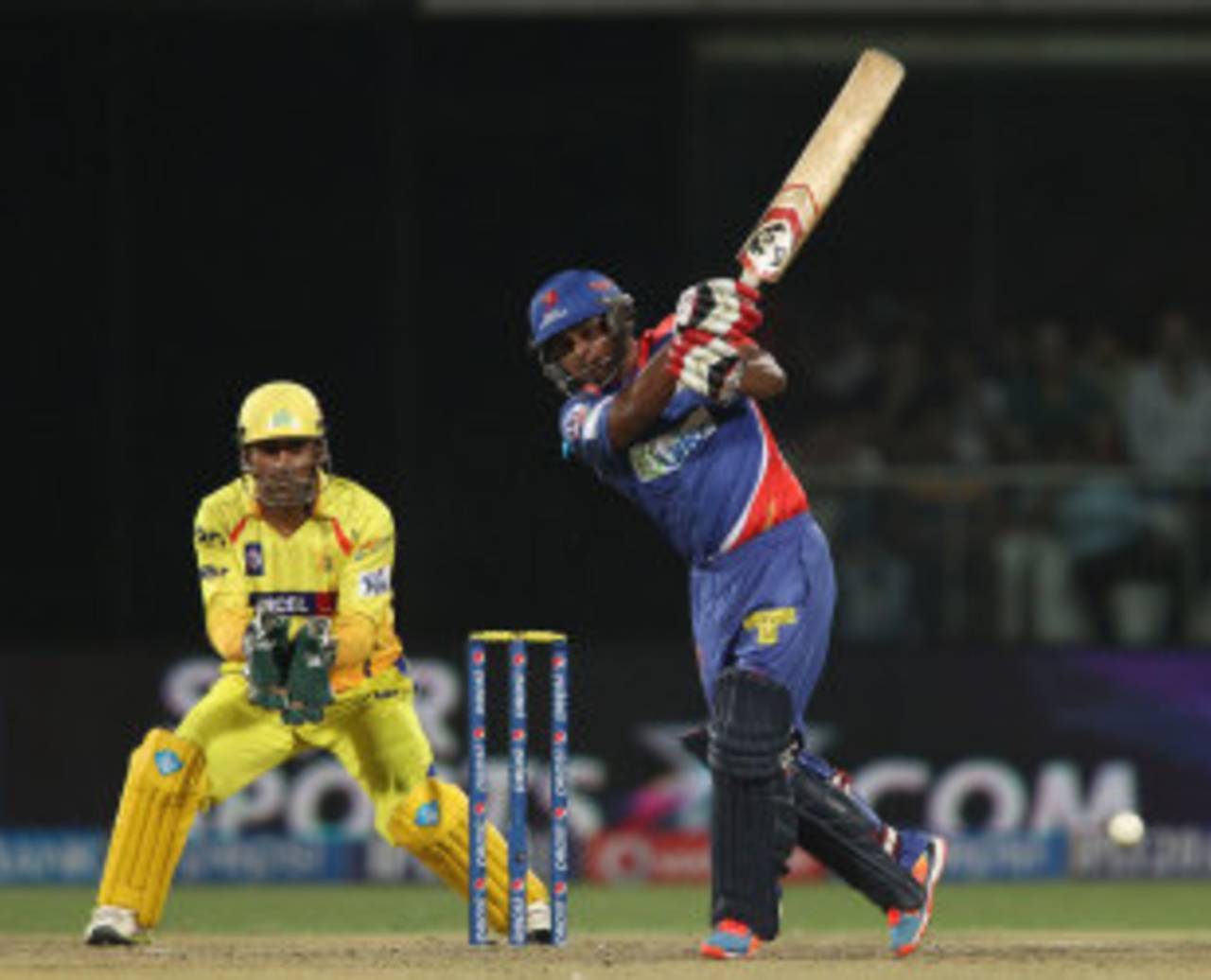Holding back Duminy, Jadhav hurting Daredevils
Certain teams have been very conservative with their batting order, giving their biggest hitters little crease time. The approach has backfired on Delhi Daredevils the most
Karthik Krishnaswamy
15-May-2014

Kedar Jadhav has been an excellent finisher, but is he batting too low? • BCCI
Imagine you are given a set of eleven names that includes both Steven Smith and Stuart Binny. Now imagine you are asked to arrange them in the batting order. If 100 cricket fans are given this exercise, you would think at least 75 of them - unless they are all rabid Karnataka fans - would bat Smith ahead of Binny, no matter which format this hypothetical XI is playing. It is simple cricketing logic.
Try telling Rajasthan Royals that. This season, Binny has batted nine times for them. He has gone in eight times at No.5, and once at No.6. Smith, meanwhile, has batted seven times, each time at No. 6. This despite the fact that Binny has had a poor season - he averages 16.28, has a strike rate of 115.15 - while Smith has had a good one - average 36.75, strike rate 133.63.
In their last match, against Chennai Super Kings, Royals were 84 for 1 at the 10-over mark before losing two wickets in three overs. At this stage, they could have sent in Smith, who had just struck an unbeaten 21-ball 48 in a fairytale chase against Royal Challengers Bangalore. Instead, they sent in Binny, who had made scores of 12, 8, 0*, 0, 11, 12 and 1 in his last seven innings.
This sort of thing is all too common in the IPL. Mumbai Indians would send in Aditya Tare and CM Gautam ahead of Kieron Pollard while Kings XI Punjab have promoted Wriddhiman Saha over Glenn Maxwell. Tonight, Royals take on Delhi Daredevils, who have persisted just as stubbornly with tactics that have been just as puzzling. For some reason, they have given their two most consistent batsmen this season an absurdly small share of their 20 overs.
JP Duminy and Kedar Jadhav not only own Daredevils' highest averages this season - 66.40 and 69.50 - but also their two highest strike rates. They have done brilliantly as finishers, but thanks to the iffy form of the players batting above them, they have usually converted below-par foundations into mid-size skyscrapers.
You can understand their places in the batting order considering Daredevils have the likes of Quinton de Kock, M Vijay, Kevin Pietersen and Dinesh Karthik batting above them, but they have gone to bizarre lengths to keep Duminy and Jadhav stuck down the order, no matter what.
For three straight matches, they promoted Laxmi Shukla ahead of Jadhav. In two of those matches, Shukla walked in ahead of Duminy as well. In those three matches, Shukla made 0 off 2 balls, 10 off 14, and 21 off 22. Daredevils were batting first each time, and they lost each time after setting middling targets.
During the last of those matches, against Sunrisers Hyderabad, they sent Shukla in at No. 5, knowing fully well that rain was imminent, knowing fully well that they needed to post as big a total as possible to avoid getting on the wrong end of a Duckworth-Lewis equation.
In the time Shukla was at the crease, Daredevils added 59 runs in 48 balls. When Shukla was out for 21 off 22, both Duminy and Jadhav were on 0, and only 19 balls remained of the 20 overs. For once, both their finishers failed. Daredevils made 143. After a series of rain interruptions during their chase, Sunrisers finally won the match with a score of 44 for 2 after 4.2 overs.
In their next match, against Royal Challengers, Daredevils left out Shukla, and brought in the opener Vijay. Neither Duminy nor Jadhav, therefore, was to get a promotion - not even when Daredevils were set a target of 187. Even then, they sent in Mayank Agarwal, who had not been in particularly great form before that, at No. 3.
By the time Jadhav walked in to join Duminy, Daredevils needed an improbable 85 off 42 balls. Duminy made 48 off 30, Jadhav 37 off 20. Daredevils lost by 16 runs. You wondered how close they would have gotten if their two most in-form batsmen had been able to spend more time at the crease. You wondered how many more matches they might have won had they spent more time at the crease more often.
Karthik Krishnaswamy is a senior sub-editor at ESPNcricinfo